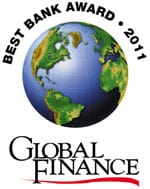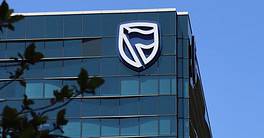Global Winners
Best Corporate Bank
JPMorgan Chase
JPMorgan Chase provides many of the world’s most prominent corporations with the financial services they need to succeed in global markets. With $2 trillion in assets, the bank operates in 60 countries and is expanding its corporate banking services in fast-growing emerging market economies, such as China, India and Brazil. The bank is also bolstering its corporate banking operations in the UK, Germany and Switzerland.

J.P. Morgan, its investment bank, earned more financial advisory and underwriting fees than any other bank for a second straight year in 2010. The investment bank’s earnings rose 49% in the second quarter of 2011 from the same period a year earlier, as revenue climbed 16%.
As of June 30, 2011, the bank’s capital position, according to the Basel III capital rules, stood at 7.6%. CEO Jamie Dimon has been leading the banking industry’s battle against proposed Basel committee rules that would require systemically important financial institutions to hold coreTier 1 capital of as much as 9.5% of total risk-weighted assets by 2019.
“Our second-quarter earnings reflected solid performance across most of our businesses,” Dimon says. “The investment bank delivered strong earnings across most products and maintained its number-one ranking in global investment banking fees. Commercial banking reported record revenue and continued loan growth for the quarter.”
—Jamie Dimon, chairman and CEO
Best Consumer Bank
HSBC
London-based HSBC is Europe’s biggest bank by market value and number three in the world by assets. The bank is heavily focused on Asia, a region that accounts for the majority of its profits. HSBC’s earnings more than doubled last year to $13.2 billion, as loan losses were nearly cut in half.
The bank reported a profit of $454 million in North America last year, following a $7.7 billion loss in 2009. HSBC began reporting earnings on a quarterly basis with the first quarter of 2011. Its profit for the three months was up 58% from the same period a year earlier—to $4.15 billion. Provisions for loan losses were cut by 37%.
“I don’t think that we are at an ideal business mix,” Stuart Gulliver, group CEO said in a conference call. “I want to see a shift in revenue in the group toward emerging markets.” HSBC serves more than 41 million customers from its nearly 8,000 offices in 87 countries. It is one of the few UK-based banks that did not request a government bailout during the financial crisis. Loan activity is recovering, led by Asia, and non-performing loans have fallen to the lowest level since the financial crisis began.
—Stuart Gulliver, group chief executive
Best Private Bank
Credit Suisse
Credit Suisse, Switzerland’s second-largest bank, has capitalized on the fact that it did not require a government bailout during the financial crisis to build its market share in private banking. As the bank’s wealthy clients begin to invest more actively, fee and commission revenue is increasing. The strong Swiss franc, however, is creating headwinds.
The bank’s extensive presence in emerging markets, particularly in Asia, is helping it to attract new client assets. The Asia-Pacific region is now second to North America in the total number of millionaires, having surpassed Europe this year. Credit Suisse has enjoyed growth in private banking assets of about 20% annually in the fast-growing Asian region over the past three years.
Credit Suisse received notice in July 2011 that it was being investigated by the US Department of Justice and other authorities regarding private banking services provided on a cross-border basis to US taxpayers.
The bank said in a statement that it will continue to cooperate with US authorities to resolve these matters. It has “already been responding to requests for information, including subpoenas.”
The statement came five months after four Credit Suisse employees from the private banking division were indicted by the US on charges they had conspired to assist clients to evade taxes in the US.
—Walter Berchtold, CEO of private banking
Best Emerging Markets Bank
Standard Chartered Bank
Standard Chartered receives more than 90% of its income and profits from Asia, Africa and the Middle East. It said in its interim management statement that its net income grew in double digits in the first quarter compared with the same period a year earlier.

“Standard Chartered has enjoyed an excellent start to 2011, with good momentum in both [consumer and wholesale] businesses,” says Peter Sands, group chief executive. “We continue to benefit from the disciplined execution of our strategy, and we remain very well positioned in dynamic markets with strong fundamentals.”
The bank said income was broadly spread across its operations. Its wealth management business performed particularly well in Hong Kong and Singapore. At the group level, the bank said it is well capitalized and highly liquid. Standard Chartered survived the global financial crisis without state assistance.
—Peter Sands, group CEO
Best Islamic Financial Institution
Kuwait Finance House
With global operations that encompass the Islamic financial centers in the Middle East as well as Southeast Asia, Kuwait Finance House is expanding in Europe. KFH and its Liquidity Management House subsidiary have developed shariah-compliant products and services that are both practical and innovative.
In its home market of Kuwait, LMH has played a leading role in using sukuk to restructure the debts of local companies, particularly investment companies. LMH supervised the re-structuring of debt agreements of Gulf Investment House and of First Investment in June. Earlier this year, KFH and other Kuwaiti banks signed an agreement to restructure the debts of Aref Investment Group.
KFH also led the restructuring of the debts of Al-Oula Investment by turning them into sukuk. LMH is a significant participant in the regional and international sukuk markets and in shariah-compliant structured finance.
It has developed Islamic financial structures in project finance, real estate and infrastructure finance. KFH Malaysia was the first Islamic bank to offer sukuk in the Japanese market.
—Mohammed Sulaiman Al-Omar, CEO
Best Asset Management Bank
State Street Global Advisors
State Street Global Advisors, the investment management arm of Boston-based State Street, is one of the world’s largest managers of institutional assets and one of the largest providers of exchange-traded funds. SSgA has also filed for permission to offer actively managed ETFs.
As of June 30, 2011, SSgA had $2.12 trillion in assets under management, up 15% from a year earlier. Last October it acquired Bank of Ireland Asset Management, with about $42 billion in assets under management and 500 clients.
State Street’s second-quarter 2011 earnings rose nearly 18% from the same quarter a year earlier—to $502 million. Joseph Hooley, State Street chairman, president and CEO, cited growing global demand for fee-generating services and management.
The increase was driven by higher revenue from investment services. Investment management fees rose 24%, and securities finance revenue increased nearly 26%. State Street’s overall revenue rose 8% to $2.49 billion.
—Scott Powers, president and CEO
Best Custody Bank
BNY Mellon
BNY Mellon is the world’s biggest custody bank, with $26.3 trillion in assets under custody and administration at June 30, 2011—an increase of 21% compared with the prior year. The increase reflects the acquisitions last July and August of the UK’s Global Investment Servicing and Germany’s BHF Asset Servicing, as well as new business and the change in market values. The acquisition of BHF made BNY Mellon the second-largest custody bank in Germany.

“When we help clients succeed, we drive value for shareholders”
– Gerald Hassell, BNY Mellon
Assets under management, excluding securities lending, rose 22% from a year earlier—to $1.3 trillion as of June 30, 2011. Investment service fees increased 27% to $1.8 billion. BNY Mellon’s capital ratios rose after a dividend increase and stock repurchases. It generated $803 million of Tier 1 common equity in the second quarter, primarily driven by earnings retention. The bank had a Tier 1 common ratio of 12.6%.
Expense growth remained high, due in part to legal and regulatory costs. Gerald Hassell, president and a board member of BNY Mellon, was made chairman and chief executive in August. He says: “When we help clients succeed, we drive value for our shareholders.”
—Gerald Hassell, chairman and CEO
Best Investment Bank
Morgan Stanley
Morgan Stanley’s investment bank ranked number one in global mergers and acquisitions completed in the second quarter of 2011 and had the highest second-quarter earnings since 2007. The firm led all equity capital market underwriters globally in 2010. Not only was the bank number one in initial public offerings, as well as follow-on issues, but it was also the leading equity bank in all three major regions: North America, Western Europe and Asia.
Morgan Stanley underwrote 322 equity and equity-related issues worldwide last year with total proceeds of $80.7 billion.
Of these, 99 were IPOs, which raised a total of $22.4 billion. “Our performance in 2010 reflects a core strategic commitment to serving clients,” says Paul Taubman, co-president of institutional securities and head of Latin America and Japan at Morgan Stanley. “That business principle sets us apart, particularly in challenging markets and economic cycles. During the recent financial crisis, for example, we re-doubled our commitment to maintaining a leading client franchise. We invested in talent, resources and ideas.”
—James Gorman, president and CEO
Best Cash Management Bank
Citi
Citi’s Global Transaction Services division invests $1 billion annually in technology in an effort not only to keep up to speed with customers’ needs, but also to preempt their future requirements, particularly when it comes to new payment types, such as prepaid cards and mobile payments. Citi is launching a mobile payments collection solution, and near the end of last year launched Treasury Diagnostics—an online benchmarking solution for working capital and liquidity management benchmarking, among other processes. It is also building on the success of earlier innovations by adding an intercompany lending module to its award-winning TreasuryVision platform. Naveed Sultan, Global Head of Citi’s Treasury and Trade Solutions, says: “Citi prides itself on developing innovative cash management solutions that give our clients an edge in a rapidly changing marketplace.”
—Naveed Sultan, global head of Citi’s treasury and trade solutions, Citi GTS
Best Trade Finance Bank
Citi
Citi provides trade finance services in 86 countries, with a market-leading network that handles more than two million cross-border trade transactions a year. “Our globality as well as our local expertise have helped us to continue to meet our clients’ needs and garner market recognition for Citi,” says John Ahearn, managing director and global head of trade at Citi. There will likely be a consolidation of the trade business in the coming year, and Citi can play the role of industry consolidator, he says.

“In general, with these new [regulatory] requirements, banks won’t have the capital to operate in every business line,” Ahearn says. “Those banks that treat trade finance as a hobby could outsource, exit the business or go into partnership with someone else.”
The traditional book-and-hold strategy of issuing trade credits is no longer sustainable, Ahearn says. Citi has created a multi-bank global trade program that will enable a group of participating banks to originate and fund trade finance assets more efficiently through a structured issuance of asset-backed securities and commercial paper.
—John Ahearn, managing director and global head of trade
Best Foreign Exchange Bank
Deutsche Bank
Deutsche Bank has the largest, most diversified and most profitable foreign exchange operation in the world. “The critical factor is that we are excellent across the board, by client type, by region and by products,” says Kevin Rodgers, global head of FX derivatives. “We are entering a period when foreign exchange is front and center for both funds and corporations,” Rodgers says. From 2001 until 2007, foreign exchange market volatility was relatively low and it was easy to hedge, but since the global financial crisis FX volatility has been dramatic. Imbalances in the world economy increasingly played out in the FX market, Rodgers notes.
Providing customized solutions to its clients has long been a core part of Deutsche Bank’s strategy. “A bigger and bigger percentage of the trading flow is done online,” Rodgers says. “We believe the FX derivatives markets will go the same way, after a delay because they are more complicated and require different technology.”
—Zar Amrolia, global head of foreign exchange
Best Sub-Custody Bank
Citi
Citi’s Global Transaction Services division has the largest proprietary custody network in the world, covering 61 markets, with the recent addition of South Africa and Panama, notes Lee Waite, global head of direct custody and clearing at Citi. “Investors, and therefore Citi, are looking at Africa to a greater extent than ever before,” he says.
There is little custody coverage in Central America at the moment, Waite adds, but Citi’s new operation in Panama will enable it to serve other countries in the region, such as Costa Rica. Citi is also seeing increased interest from clients in the Middle East, and frontier markets such as Mongolia and Cambodia are also in its sights. Citi is the leading subcustodian in the US, the world’s largest subcustody market, and boasts a range of clients, from asset managers to broker-dealers and global custodians.
—Lee Waite, global head of direct custody and clearing




